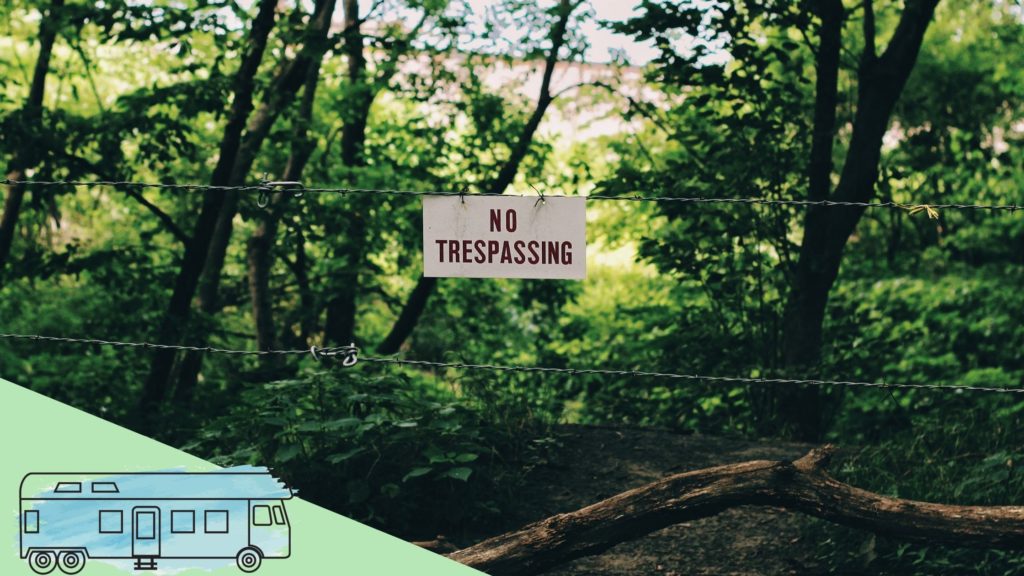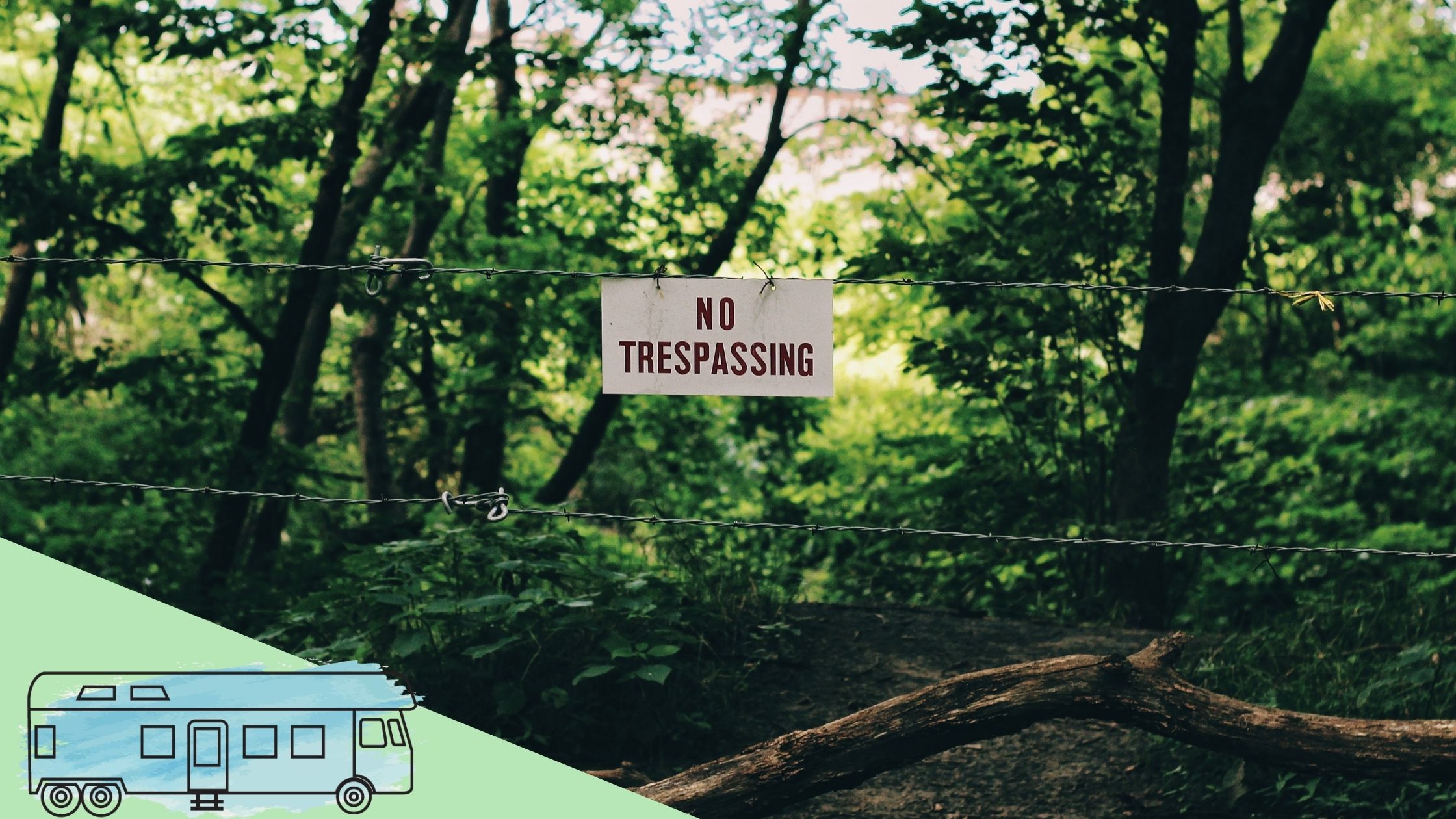Disclaimer: This article is the result of my thorough research, but I’m not a lawyer, and this is not legal advice.
Trespassing is one of the biggest concerns of property owners. Just like any other part of the world, invading someone’s property without asking their permission is considered trespassing in New Zealand.
In New Zealand, it’s considered trespassing when you intentionally enter, dump waste, or are staying on someone’s property without their permission. On the other hand, you are allowed to camp in any non-private area unless otherwise marked.
During your travel, taking a shortcut that passes through a private property might look very convenient but it isn’t always the best decision. Sometimes, you might get charged for breaking the trespassing rules. In fact, most travellers, especially the ones on an RV/camper trip prefer parking and staying at places that are free such as some park, farm, or any piece of land. And sometimes while doing so, they unexpectedly receive a trespass notice in their hands which sometimes comes along with significant fines. That’s true, it happens many times even when there wasn’t any bad intention.
Trespassing is definitely an unlawful activity which is a major concern of the property and business owners. However, it is slightly different from a traveler’s point of view. To offer you some useful pieces of trespassing advice in NZ and to save you from hefty fines, I have compiled this article with all the necessary information you would need during your trip to the land of Kiwis.
What is considered trespassing in New Zealand?
If I’m not wrong, most of you think that trespassing means entering a property without the permission of its owner. While it’s not entirely false, it is not very simple as well. A shopping store, for example, welcomes its visitors whole-heartedly. Yet, it is possible to be called a trespasser on the property of that retail center.
Every state and country has its own definition of trespassing. However, all the definitions around the world agree on a common statement “Intentionally entering or staying on someone’s property without their permission or any authorization”.
This is the reason, if you trespass a shopping store, you’ll not be considered to be a hindrance in the business. However, if you sneak into a retail center, you’re interfering with the operation of the business. This was just an example but it is the same for any park or property you might be considering for your stay.
And wait, trespassing can also be done without stepping or remaining on the property. If by any chance you’ve dumped your waste onto someone else’s property or have unloaded your unnecessary stuff there, it will also be considered trespassing. You may be fined hefty amounts in such cases. Hence, knowing the trespassing laws is very necessary, especially when you’re traveling to a new state or country!
Is a trespass notice a criminal conviction (NZ)?
According to the Trespass Act 1980, if you have been warned to stay away from a property and you don’t leave or come back before the time mentioned in the notice, it will be considered a criminal offense. The penalty for such type of offense can be fine as high as $1,000 or up to 3 months of prison.
How long does a trespass notice last in NZ?
In most cases, a trespass notice lasts for two years. However, it depends on the property owners, they can withdraw the notice anytime they want. In case a property owner wants to withdraw the notice he has given, he will let that person know that the notice is no longer active.
Is walking through someone’s yard trespassing?
Trespassing is simply being in someone’s property where you’re not privileged to be in. Unless you’re invited, such as a public park, private home, or any commercial center, then you’re not allowed to be on or on any property.
In general, you will not be charged with trespassing unless you’re on notice that you aren’t welcome to that backyard. In other words, if that yard you’re walking in doesn’t have a “no trespassing” sign, you will not be charged, in most cases. On the other hand, if there is a “no trespassing” sign and you still cross the property, you might get charged if caught by the property owner.
Whether it is legal or illegal, always take the permission of the property owner before using their property even if your goal is to just pass by. So, simply knock on the door, introduce yourself, tell your intentions and ask if you can walk through their yard or camp there. Also, do the same if you’ve already crossed their yard without their permission and this time, say a heartfelt sorry. If you do this, chances are the owner will let you use his property without asking for any charge or fine.

How do you trespass in NZ?
You can’t and you shouldn’t trespass in NZ or any other part of the world. I’ve already discussed umpteen times that trespassing means to enter or stay in/on a property without the permission of its owner. Why would someone want to do that? I mean, even if your intentions are pure, you shouldn’t use someone’s area without their permission.
So, to repeat, ask for permission before using a private area. And if you get caught trespassing, don’t run or hide because this way you may upset the owner. Instead, stop by, go to them and apologize and ask if you can stay there for a little longer. If the owner says no, then take your stuff and move to some other place.
Can you get fined for wild camping in New Zealand?
Wild camping or freedom camping means camping at any place that isn’t a designated holiday park or campground. You’re wild camping if you set your tent in a forest, on a beach, or any open ground. New Zealand offers one of the best wild camping experiences and if you want to experience the same – here is good news!
Section 10 of the qwFreedom Camping Act 2011 states that you can camp in any area unless and otherwise camping is prohibited in that area. This means you can camp freely anywhere without worrying about the penalty.
However, the rules of wild camping in New Zealand can vary depending on the part of the country you’re in. There are local laws of each state and territory that should be followed necessarily by the visitors who want to enjoy wild camping. For instance, some states won’t allow you wild camp within the close proximity of a town or may only allow you to stay for a few hours.
Generally speaking, as long as you don’t leave any waste or trash behind, you can camp anywhere provided that there are no signs of restrictions.
Freedom camping is permitted in any local authority area unless it is restricted or prohibited in an area.
– Section 10, Freedom Camping Act 2011
While you’re allowed to wild camp in most parts of New Zealand, if you don’t comply with the rules and break any wild camping law, you will have to pay a $200 fine almost instantly.
Below are the conditions where you can be fined :
- You’ve caused any damage to the area you were camping in.
- You’re camping in a restricted area.
- You’re not providing any information to the officer (a council worker or a DOC officer)
- You’re staying even after you’ve told to leave
- You’re camping with a vehicle that’s not self-contained
- You’re dumping rubbish in the area you’re camping in
- You’re going toilet in the open
Apart from these, if you behave inappropriately towards an officer or a worker of DOC or local council, you may instantly be charged a $5,000 fine. Further, if you dump toxic waste on the site, you may receive a fine of up to $10,000, as ordered by the court.
Moreover, you have to pay the fine within 28 days of receiving it. The details and all the rules will be provided to you on the notice. If you refuse to pay the fines, you may be taken to court where you may also get sentenced to a few months of jail.
What types of vehicles are allowed for safe wild camping?
The good news is, you’ll not need to trespass on anyone’s property because you can camp in any area that comes under the public domain, i.e. wild camping.
And having the right type of vehicle on your trip can make your wild camping experience highly comfortable and convenient. Most wild camping rules apply to personal vehicles including cars, motorhomes, vans, campervans, RVs, caravans, etc.
Perhaps the most common rule you will find while searching for an appropriate wild camping location is, your vehicle should be self-contained. This means you should be able to live in your vehicle for up to three days without needing any more water or disposing of waste.
If you want to learn more about where you can park a campervan in New Zealand you should definitely check put my list here…
As per the New Zealand government, a self-contained vehicle should have the following :
- A freshwater storage
- A toilet facility
- Waste water storage
- A trash bin with a tight lid
… sounds pretty much like a campervan, right?
Completely self-contained vehicles are the best way to travel across the country. They are highly convenient and suitable for camping as they come with toilet facilities.
That’s all about it. I have answered “What is considered as trespassing in New Zealand” along with several other useful questions. I hope this guide clears all your doubts and helps you in exploring the beautiful attractions of New Zealand.
Happy and safe travelling!


